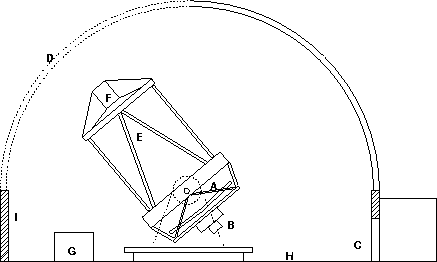



Next: The
"steady local air" Up: Engineering
formulae for local Previous: The
free convection case
DOME SEEING
Dome seeing, in its general meaning of seeing generated by turbulent fluctuations
of the index of refraction inside a telescope enclosure, can be distinguished
into different phenomena:
-
Seeing caused by free convection in the entire enclosure volume, generated
typically by a floor warmer than ambient air.
-
Mirror seeing, caused by a temperature difference between the surface of
the primary mirror and air.
-
Seeing from the secondary mirror unit.

Figure 3: Causes commonly held to be source of dome seeing:
-
A
-
Convective air flow near caused by a surface-air temperature difference
at the primary mirror: this causes the so-called mirror seeing
-
B
-
Convective air flow from the Cassegrain instrumentation located behind
the primary mirror
-
C
-
Air flow through entrance doors to the telescope volume
-
D
-
Turbulence across the observation slit of the enclosure
-
E
-
Convective air flow from the members of the telescope structure
-
F
-
Convective air flow from the secondary mirror unit
-
G
-
Convective air flow from the heat generating equipment inside the enclosure
-
H
-
Convective air flow from the enclosure floor
-
I
-
Convective air flow from the dome and enclosure walls
The key for understanding the dome seeing phenomenon lies in a correct
appreciation of the different free or weakly mixed convection flow patterns
which may be found in the air volume crossed by the optical beam. A main
characteristic of free convection flow lies in the fact that temperature
gradients and fluctuations are greatest close to the heat exchange surface
while the far region experiences the largest velocities (see for instance
Townsend[5] pp. 381-392). Thus one shall
expect that the seeing disturbance, being caused by temperature fluctuations,
decreases rapidly with the distance from the heat exchange surface.




Next: The
"steady local air" Up: Engineering
formulae for local Previous: The
free convection case
Lorenzo Zago
1998-07-05
